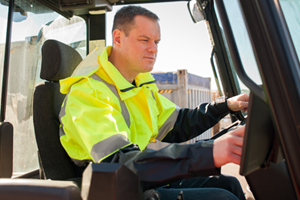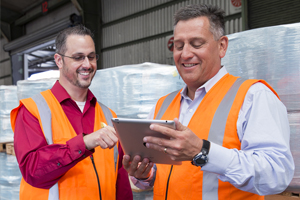All ports face a digital transformation. It’s not a matter of if, but when. The maritime ecosystem is growing, players are changing, cargo volumes are increasing and customers are demanding better service and efficiency. The only way for ports to survive this transforming environment is to grow along with it. The greatest influencer of this transformation is technology, so it’s not surprising that the number one prediction for the shipping supply chain in 2019 is more budget allocated to IT spend, according to the Navis Business Bellwether Report[1]. Much of that budget is expected to be targeted at new technologies to improve operational performance.


Traditionally a conservative bunch, Port Operators can’t argue the deafening demand for improved operations. Marco Neelsen, chief executive of Malaysia’s Port of Tanjung Pelepas (PTP) said at TOC Asia 2018: “It’s about how efficient you are, how quickly and how cost efficiently you can move the container from A to B.” [2]Ports that are brave enough to explore this digital world further, will benefit enormously, with even the smallest of steps forward.
A key part of the digital transformation driving smarter ports are mobile applications, or browser–based web apps, that complement your terminal operating system (TOS). These apps offer a user–friendly way to improve logistics management and cargo activities in real time, putting the power of information at your fingertips.
At Jade Logistics, we understand the importance of ensuring that technology is not a distraction, but a tool that allows users to be more efficient and ports to deliver better service to their customers. Our TOS, Master Terminal, is complemented by a Web Apps Suite that has been designed to make mobilizing your workforce a cost-effective solution that delivers real productivity and efficiency gains across your operation. These web apps support a ports’ deployment of TOS functionality at different levels and roles on the terminal, as well as providing choice with respect to compatible hardware devices. Automatic updates for the apps are provided in each release of Master Terminal and occur at the server level, eliminating the need for disruptive software upgrades and ensuring effortless maintenance.
Master Terminal’s comprehensive Web Apps Suite enable you to make informed business decisions using real-time data so that you can work smarter, not harder.
WEB PORTAL
Master Terminal Web Portal provides transparency of information to the wider supply chain, freeing up port staff to focus on core operational tasks. Offer your customers (including truckers, consignors, consignees, shipping companies, customs and government officials) access to selected Master Terminal functionality via a web browser. Empower your customers by providing access to real-time information about the status of their cargo and other relevant services.
VEHICLE BOOKING SYSTEM
Master Terminal’s Vehicle Booking System (VBS) allows you to easily manage the flow of vehicles throughout your gate operations. The VBS allows you to control vehicle arrival times to match your terminal’s work schedule, ensuring less downtime and congestion at the terminal gate. Schedule when transport operator vehicles can visit your terminal to evenly distribute the flow of vehicles throughout the hours of operation, and make better use of cargo handling machinery on the port.
VEHICLE APP
Increase driver productivity with the Master Terminal Vehicle app. Our vehicle app was designed with your drivers in mind, ensuring those at the coalface of the port are provided with real-time information that allows them to seamlessly perform their work. Featuring an intuitive and easy to navigate interface with large buttons, the vehicle app is user-friendly and quick to learn, regardless of the user’s technical ability.
HANDHELD APPS
Extend your TOS functionality with Master Terminal’s cost-effective Handheld apps. There is an ever increasing need for real-time information and fulfilment. For terminal operators this means operating as efficiently as possible and optimizing turnaround times. Master Terminal’s suite of handheld apps allow you to make informed business decisions with accurate up-to-the-minute information, provide real-time monitoring and reporting, reduced human error, and ultimately offer better customer service.
TALLYMAN
Master Terminal Tallyman accurately captures final cargo stowage on a vessel in real time, online and offline. Working with Roll-On/Roll-Off (RORO) and Lift-On/Lift-Off (LOLO) planning in Jade Logistics’ Master Terminal, Tallyman operates on modern devices (optimized for screens greater than 7”) and web browsers. Even when working out of range of your terminal network (e.g. the hold of a ship), Tallyman’s offline store and forward capability ensures all data is captured and recorded. Tallyman assists in creating a more complete picture of cargo transactions, enabling ports to operate more efficiently.
Ensure you are port smart with web apps that can help you reduce delays and cost, while increasing throughput and efficiencies. A digital transformation can help you better manage your resources and ensure you remain competitive. Secure and embrace your smarter future!
If you would like to learn more about our Web Apps Suite and how Master Terminal can help you get port smart, please contact us.
—–
[1] Navis Business Bellwether Report (Download BPI Network Study). (2018, November). Retrieved February 22, 2019, from http://www.bpinetwork.org/thought-leadership/studies/69
[2] Neelsen, M. (2018, June 7). Port Strategy | Digitalisation more important than automation. Retrieved February 22, 2019, from https://www.portstrategy.com/news101/port-operations/planning-and-design/digitalisation-more-important-than-automation

